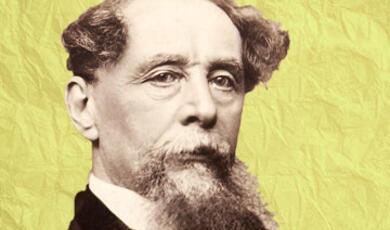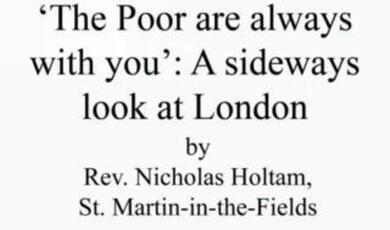The Language of the King James Bible: Ongoing Translations
Share
- Details
- Transcript
- Audio
- Downloads
- Extra Reading
Professor David Ford presents his research into the hermeneutics of Bible translation.
Download Transcript
26 September 2011
The Language of the King James Bible
Ancient and Modern: Ongoing Translation of the Bible
David F. Ford
When King Henry VIII founded my chair of Divinity in 1540 he also founded two others: the Regius Professorships of Hebrew and Greek. His vision of the Church required scholarship in the Biblical languages and sound translation into English, and, when the teams for the King James Bible were selected, the Cambridge University Regius Professors of Hebrew and Greek at the time were given leading roles. But I want now to approach our topic of ongoing translation of the Bible from the standpoint of mine, the third Regius chair, that of Divinity or theology. I see theology as needing to take account of what the scholars of Hebrew and Greek tell us, but also being concerned with how to cope today with the superabundant meaning of the Bible. A key element in this is appreciating what is involved in translation and allowing that grappling with the language of the Bible to contribute to the generating of contemporary understanding, imagination and action.
A great deal is at stake in this. The Bible is a good example of the old maxim, ‘the corruption of the best is the worst’. It has been, and still is, subject to terrible abuses, distortions, misrepresentations, prejudices, manipulations, deconstructions, ideological appropriations, and so on. In the avoidance or correction of these corruptions a wise approach to translation is only one element, though it is vital. In the very short time available now I will approach it from two angles: first, I will draw on my experience as a working Christian theologian who has done a good deal of interpretation of the Bible in many contexts – in academic works, in the Church and in inter-faith engagements; second, I will look at the big picture of the ongoing translation of the Bible today and in particular comment on two transformative developments during the past fifty years. And there will be a final theological thought about all this.
2 Corinthians, LXX and ‘libertie in differences of readings’
Let us plunge into a specific text, Paul’s second letter to the Corinthians. I once spent five years working with a then colleague in the University of Birmingham, Frances Young, on a book called Meaning and Truth in 2 Corinthians.[1] We wanted partly to try to unite modern biblical scholarly methods with recent work on hermeneutics (the art and theory of interpretation) – a blunt way of describing the difference between these is that scholarship does an archaeology of the text, investigating its meaning and context back there then when it was written, while hermeneutics is interested more in its ongoing meaning in different contexts down the centuries, and especially today. But we also wanted to do contemporary theology – to ask, for example, in dialogue with this letter, about what authority is now or who God is for us – hence the ‘truth’ in our title. They were five fascinating years, at the end of which we felt we had barely scratched the surface of this short, extraordinarily dense text. But one of the things that stood out was the rightness of our decision to make our own translation of the letter. It was precisely as we wrestled with Paul’s sometimes very difficult Greek that we were led to face not only the scholarly and hermeneutical questions but also the big theological questions.
Let us look at 2 Corinthians 8-9, which you have in a handout in Greek and in four translations, King James Version, New Revised Standard Version, Amplified Bible and the one by Frances Young and myself. I have printed in bold one recurrent word, charis, in the Greek, and its various translations into English. You can see that KJV uses three words: grace, gift and thanks. NRSV uses six: grace, privilege, generous undertaking, generous act, thanks and blessing. Amplified uses thirteen: grace, favour, spiritual blessing, beneficent and gracious contribution, gracious work, kindness, gracious generosity, undeserved favour, thanks, bountiful contribution, earthly blessing, mercy and gift. Frances and I use three: grace, thanks and gracious task. But that is only the tip of the iceberg. The problem is that Paul is talking about a collection of money being made for the church in Jerusalem but is describing it not only as charis but also by other terms that, like charis, are woven into his gospel and theology. He never actually uses the literal word for ‘collection’ (logeia) that he employs in 1 Corinthians (16:1, 2), but instead an array of theologically loaded words that yet can also refer to the literal collection – they are the words underlined in Greek and English.[2]
What is happening in these powerful chapters? Exploring how the divine economy of superabundance relates to human finances and generosity was one of the lift-off points for our discussions, both with each other and in the seminars that we led on 2 Corinthians, and it became a chapter on ‘The Economy of God’. The point for now is that Paul is taking core terms and ideas from his message of Jesus Christ and is simultaneously speaking of his fund-raising for the Jerusalem Church, so that thinking about the Gospel and thinking about money are inextricable. The language of the Gospel is stretched to embrace finances and the language of wealth and poverty is stretched to embrace the Gospel: ‘For you know the grace of our Lord Jesus Christ, that for you he became poor though he was rich, so that you might become rich through his poverty.’ (2 Cor. 8:9) The problem is this stretching of language is often the despair of translators. As we wrestled with our translation we found with relief the statement of the great Yale New Testament scholar Nils Dahl: ‘He expresses himself in a way that is impossible to translate’.[3] How appropriate is the culminating cry of the wonderful finale in Chapter 10: ‘charis be to God for his anekdiegeto gift’ – meaning unspeakable, or indescribable, or inexpressible gift.
All translation faces these sorts of difficulties, and is endlessly negotiating problematic compromises between being faithful and understandable, the literal and the paraphrase, prosaic accuracy and poetic beauty, leaving a metaphor stand or interpreting it for a different culture or period. Does ‘charis’ stay as ‘grace’ in most contexts, or do you translate ‘generous contribution’? A key recurrent issue is that of functional equivalence – what might get across a similar message with similar force in another culture? ‘Do not lead a bad person into temptation’ might be rendered in the South African Tsonga language as ‘Don’t throw a mouse into a granary of monkey nuts’. If ‘beating the breast’ expresses self-assurance and aggressiveness in Batswana, should you instead use the equivalent expression, ‘taking hold of the beard’?[4]
In Paul there is a further complication and enrichment: he is himself using a scripture that is in translation. The Hebrew Bible was translated into Greek in Alexandria by Jewish scholars a couple of hundred years before his time, and this translation, known as the Septuagint (LXX) was what he usually quoted. I remember an excited phone call from Frances Young the day she discovered that underlying a string of statements in 2 Cor. 4-5 were the Septuagint translations of Psalms 110-118, and that this greatly affected our understanding of what Paul meant.[5] Since that time I have become increasingly fascinated by the Septuagint and how differently I read the New Testament when I know better the translation of their Bible that most of its authors used. This most ancient of all translations of the Hebrew Bible is, like all translations, also an interpretation, and in my experience is always worth consulting alongside the Hebrew and English translations.
For example, I am working at present on a theological commentary on the Gospel of John and have been struck by how many allusions to the Septuagint I have discovered – my present focus being on the way the Greek of the books of Genesis and Isaiah permeates this Gospel. Another example is in the practice of Scriptural Reasoning, something I have been part of for the past fifteen years or so, in which Jews, Christians and Muslims study their scriptures together. The Septuagint, as a Jewish translation of the book that was the Bible of the Jewish authors of the New Testament, is an excellent intermediary between the Hebrew Bible and the New Testament, and again and again it illuminates both the Hebrew and the Greek New Testament.
One further thought relates to the King James Version. You will notice that in translating charis in 2 Cor. 8-9 Frances Young and I were far nearer to the KJV than to the NRSV. Some years after we published that book I was invited to be part of a team doing the opening and closing plenary sessions of the 1998 Lambeth Conference for the bishops of the Anglican Communion. The theme text of the conference was 2 Corinthians, and our group studied and discussed the letter intensively in preparation for the conference. One member suggested we use the KJV for this, and it proved to be extraordinarily fruitful: again and again it helped generate illuminating discussion and insight. That and other experiences with the KJV have convinced me that its combination of virtues (which need not be rehearsed here) make it irreplaceable as a text through which to think, imagine and discuss. I love my Precise Parallel New Testament that allows one to read seven translations alongside the Greek, and it is very often the KJV that is most generative.[6] This is a new role in the period after it has lost its virtual monopoly standing. That monopoly is obviously not going to be restored, but in this new, irreversibly pluralist setting of many translations it can more than hold its own. And in the superb Introduction to the 1611 edition addressed by the translators to the reader we read: ‘They that are wise, had rather have their judgements at libertie in differences of readings, then to be captivated to one, when it may be the other.’ This in the context refers to noting variant readings in the manuscripts underlying the translation, but it might also apply mutatis mutandis to the plurality of translations, interpretations and even theologies. I like the picture of being at liberty among many readings, with the task being to learn how, through considering and discussing them, to exercise wise and responsible discernment.
The Bible amidst 6600 languages in an electronic age
I now turn to the big picture of the Bible and its translations in the twenty-first century world.
In your handout you can see a statistical summary: 6600 languages among the world’s 6.9 billion people; 2500 languages have some part of the Bible in translation; there are 2000 more languages into which the Bible is now in the process of being translated; and there are 2252 languages spoken by 353 million people into which translation has not yet begun. And note the graph showing the change during the past 1900 years. This has not been a matter of steady expansion; rather, in the nineteenth and twentieth centuries there was a leap from 81 in 1800 to 2500 in 2011. A key factor in this was the development of Bible Societies. Note too the leap within the leap: translations more than doubled since 1950 after the United Bible Societies was formed.
There is a further major factor not included in the handout’s statistics and graph: a great many of the post-1950 translations have been done through collaborations between different churches. The Bible Societies have for most of their history been very Protestant organizations. The changed situation was brought home to me last April when I was in Rome giving a lecture and met for a morning with the head of the Italian Bible Society there, a Waldensian Protestant. The picture he gave was full of collaborations with Roman Catholic organizations, scholars and dioceses. And this is happening worldwide – I had not realized that one of the fastest growing practices among young Catholics in South America is the meditative reading of scripture together called lectio divina, or that the Bible Society resources this extensively.
Exploring and assessing this big picture could take many hours, but now I want to make two basic points.
- Catholics and the Bible
The first is the immense importance of the new way the Roman Catholic Church has related to the Bible since the middle of the twentieth century, and especially since the Second Vatican Council (1962 - 65 ). One of the main pronouncements of the Council was Dei Verbum, the Dogmatic Constitution on Divine Revelation, a key document in the ressourcement (renewed engagement with sources) that was so important in twentieth-century Catholicism, profoundly affecting its liturgy, ecclesiology, religious orders, spirituality, theological and religious education, and much else.[7] In particular, Dei Verbum strongly affirmed the importance of the Bible together with tradition and Church teaching. It emphatically encouraged study of the Bible by laity, clergy and religious, scholars and theologians; it insisted on the vital importance of the Bible for preaching, catechetics and Christian instruction; it hoped for ‘a new surge of spiritual vitality from intensified veneration for God’s word…’, and it stressed the importance of good translations and of cooperating with other Christians in producing them.[8] Such cooperation accelerated in the years following, making a major contribution to the statistics just quoted. The post-Vatican II Catholic re-engagement with the scriptures has perhaps been the most important single event in the reception of the Bible in the past century, and its scope and quality have been greatly enhanced by new translations, mostly done in cooperation with other churches.
These went hand in hand with new Catholic liturgies. The change to Mass in the vernacular meant that people heard far more of the Bible in their own language, and new translations allowed scriptural references to speak more clearly; changes in the lectionary greatly increased exposure to the New Testament (from roughly a third of it to more that four-fifths in the course of a year) and to the Old Testament (an even greater proportional increase); and priests were expected to preach on the readings. Vernacular liturgies and accompanying lectionaries are an effective way of making sure not only that the Bible is translated but also that the translations are read and heard by ordinary people.
The most recent major official event in the new Catholic reception of the Bible has been the 2008 General Assembly of the Synod of Bishops on The Word of God in the Life and Mission of the Church.[9] Again, the importance of good translations made in collaboration with other Christians was strongly affirmed, as it was also in Pope Benedict XVI’s lengthy response to the Synod. This situation of the greatly enhanced role of the Bible among the world’s billion or so Roman Catholics would have been unimaginable in the first half of the twentieth century, and it deserves far greater recognition. If it is put together with that huge number of new translations, the widespread distribution of mass-produced Bibles among ordinary Christians of all churches (especially striking in the southern hemisphere, where most Christians now live), and the avid Bible-reading inspired by the twentieth century seeing the largest single religious movement in history, as probably over 300 million people have become Pentecostals or charismatics, the ongoing translation of the Bible can be recognized as a vital element in a long-term change in the religious ecology of our world. But at the same time it emphasizes what I said at the beginning of this lecture about the corruption of the best being the worst. In a world where there is much ignorant, dangerous and foolish use of the Bible it becomes all the more important to try, in every way possible, to seek and encourage ways of reading, understanding and applying the Bible that are intelligent, responsible and wise.
- The Electronic Bible
The second point is about the electronic Bible.
New technologies obviously help in making the Bible available around the world in unprecedented ways – you can have the Bible on your computer, your kindle or i-pad, your smart phone, your i-pod, and so on. In these forms it is often more portable, shareable and searchable, and can be audible as well as readable. In addition, there can be massive additional resources for understanding the text available at the click of a mouse. Such technological developments are always two-edged, but I suspect that their positive intellectual, imaginative and spiritual potential in relation to the Bible has hardly begun to be conceived, let alone incorporated into the sorts of habitual practices of study, thought, meditation, prayer and practical application that enable scriptural traditions to flourish and renew themselves.
These new technologies also have a huge impact on the practice of translating the Bible. Almost all Bible translation projects use a comprehensive translation and editing suite called Paratext, which can work with any natural language. It monitors the translation as it is created, running consistency checks (e.g. - How has charis been translated elsewhere?), generating an interlinear translation for checking and review, and eventually exporting the text direct into the typesetting system.[10] A companion software platform called Concordance Builder helps produce a concordance from the translation, so that it comes with that invaluable tool for serious students of scripture.
Such platforms are part of what is sometimes now called ‘digital humanities’, one of the fastest growing areas of information technology in universities and related institutions. The more sophisticated the technology the more demanding are the tasks of devising and writing programmes and then using their immense capacity in scholarship. In my experience the thousands of operations that a package such as Bibleworks or Accordance enables are only employed by a tiny minority of users: to get the best out of them requires something like the application and practice needed to learn a new language.
I will give one example from my own current work with just one of the many innovative projects happening in this area. The Cambridge Inter-faith Programme, which I direct, has for some years been working with a Californian company called Meedan to make Nurani, an online platform suited to various types of inter-faith engagement served by high quality translation between Arabic and English. Besides being used to bring leaders and commentators into dialogue across this language barrier, most effort (now being funded by this country’s Research Councils in conjunction with the Coexist Foundation) is going into bringing the practice of Scriptural Reasoning online in Arabic and English. This requires, for example, software that not only helps in translating Arabic into English but which also recognizes when the Arabic is from the Qur’an or Hadith. In Scriptural Reasoning discussions, scriptures are often quoted or paraphrased, and in addition many other types of discourse may be used – history, philosophy, law, literary criticism, economics, and so on. The challenge of translating this sort of discussion in such a way that both Arabic and English speakers can grasp as much as possible of each other’s meaning and range of reference includes being able to translate scripture when it is interwoven with the other discourses. The final translation of such complex language has to be by a skilled interpreter, but with the digital assistance of a programme that can work in Hebrew, Greek, Arabic, English and other languages, and also allow for rapid critical response by others online in different countries.
For many of us involved in inter-faith encounter between Judaism, Christianity and Islam, Scriptural Reasoning has been a practice that has exemplified the best form of engagement – one that, through study and conversation around the three scriptures, allows participants to go deeper into the faiths of others, deeper into their own faith, and deeper into discerning what might serve the common good of our world. Each is able to stand within his or her own tradition and to face differences together as well as discover what is shared. And one thing that is evident in every one of these small group sessions gathered around the three texts is how utterly central translation is. What Frances Young and I discovered as we translated 2 Corinthians is repeated many times over in these Scriptural Reasoning groups, where often there are some members who know Hebrew, Greek and Arabic: wrestling with translation raises profound questions of meaning, truth and practice. And if these are at the same time being wrestled with by those of other faiths as well as your own and even by those who do not identify with any faith, the challenges of being at liberty among many readings can, at its best, lead to a shared wisdom-seeking through interpreting scriptures together. This has considerable potential for good in a world where there is much ignorant, foolish and dangerous interpretation of the scriptures of all traditions.
Conclusion: ‘… a whole paradise of trees of life …’
In conclusion, in this year celebrating the 400th anniversary of the King James Bible, I want to quote one of my favourite parts of the Introduction to the first 1611 edition. It evokes the worlds of classical Greece and Rome that were so much part of the translators’ culture in the aftermath of the Renaissance; it shows their savouring of eloquence and richly imaginative language; it weaves a new tapestry out of scriptural words and imagery; and above all it is a tribute to the superabundance of the Bible, and to the inexhaustible riches of meaning, truth and practical wisdom that the authors had found through their long immersion in the labours of translation:
‘Men talke much of εἰρεσιώνη [eiresione][11], how many sweete and goodly things it had hanging on it; of the Philosphers stone, that it turneth copper into gold; of Cornu-copia, that it had all things necessary for foode in it; of Panaces the herbe, that it was good for all diseases; of Catholicon the drugge, that is in stead of all purges; of Vulcans armour, that is was an armour of proofe against all thrusts, and all blowes, &c. Well, that which they falsly or vainely attributed to these things for bodily good, wee may justly and with full measure ascribe unto the Scripture, for spirituall. It is not onely an armour, but also a whole armorie of weapons, both offensive, and defensive; whereby we may save our selves and put the enemie to flight. It is not an herbe, but a tree, or rather a whole paradise of trees of life, which bring foorth fruit every moneth, and the fruit thereof is for meate, and the leaves for medicine. It is not a pot of Manna, or a cruse of oyle, which were for memorie only, or for a meales meate or two, but as it were a showre of heavenly bread sufficient for a whole host, be it never so great; and as it were a whole cellar full of oyle vessels; whereby all our necessities may be provided for, and our debts discharged. In a word, it is a Panary of holesome foode, against fenowed traditions; a Physions-shop (Saint Basill calleth it) of preservatives against poisoned heresies; a Pandect of profitable lawes, against rebellious spirits; a treasurie of most costly jewels, against beggarly rudiments; Finally a fountaine of most pure water springing up unto everlasting life. And what marvaile? The originall thereof being from heaven, not from earth; the authour being God, not man; the enditer, the holy spirit, not the wit of the Apostles or Prophets; the Pen-men such as were sanctified from the wombe, and endewed with a principall portion of Gods spirit; the matter, veritie, pietie, puritie, uprightnesse; the forme, Gods word, Gods testimonie, Gods oracles, the word of trueth, the word of salvation, &c. the effects, light of understanding, stablenesse of persuasion, repentance from dead workes, newnesse of life, holinesse, peace, joy in the holy Ghost; lastly, the end and reward of the studie thereof, fellowship with the Saints, participation of the heavenly nature, fruition of an inheritance immortall, undefiled, and that never shall fade away: Happie is the man that delighteth in the Scripture, and thrise happie that meditateth in it day and night.’
I hope we too can in our own ways, and in some measure, share in their happiness!
©Professor David Ford, Gresham College 2011
[1] Frances M. Young and David F. Ford, Meaning and Truth in 2 Corinthians (SPCK, London, 1987; Eerdmans, Grand Rapids, 1988; reprinted by Wipf and Stock, Eugene, OR, 2008).
[2] They are: ‘koinōnia (partnership, sharing, fellowship, 8.4; 9.13; cf. Rom. 15.26), diakonia (ministration, service, relief work, 8.4; 9.12, 13; cf. 8.19,20 (the verb diakonein), and Rom 15.31), eulogia (open-handedness, blessing, liberality, willing gift, 9.5; cf. 9.6), leitourgia (service, voluntary public service, priestly religious service, 9. 12; cf. Rom. 15.27), haplotēs (single-minded commitment, simplicity, generosity, 8.2; 9.11, 13), hadrotēs (large sum of money, plentitude, liberal gift, 8.20), perisseuma (overflow, abundance, 8.14), endeixis tēs agapēs hymōn (proof of your love, demonstration of your love, 8.24), sporos (seed-corn, seed, resources, 9.10; cf. 9.6), and ta genēmata tēs dikaiosynēs hymōn (the off-shoots, harvest or yield of your righteousness, 9.10; cf. Hosea 10.12).’ Ibid., pp. 176-7.
[3] Quoted in ibid., p. 176.
[4] Jon Riding, ‘Bible translation in a changing world’, The Bible in Transmission, Bible Society (Summer/Autumn 2011) 11-13 (12).
[5] See Young and Ford, Meaning and Truth, op. cit., pp. 63ff.
[6] The Precise Parallel New Testament, ed. John R. Kohlenberger III (Oxford University Press, New York, 1995).
[7] The Documents of Vatican II, ed. Walter Abbott SJ (Geoffrey Chapman, London, 1967) pp. 111-28.
[8] Ibid., p. 128.
[9] There has been a series of official documents, notably On the Historical Truth of the Gospels (1964), The Interpretation of the Bible in the Church (1993) and The Jewish People and Their Sacred Scriptures in the Christian Bible (2001) and ‘Let Us Approach the Table of the Word of God’, the concluding message of the 2008 General Assembly of the Synod of Bishops on The Word of God in the Life and Mission of the Church (http://www.vatican.va/roman_curia/synod/documents/rc_synod_doc_20080511_instrlabor-xii-assembly_en.html).
[10] Riding, ‘Bible translation’, op. cit., 13.
[11] From Greek mythology – See Plutarch’s Lives, The translation called Dryden’s, vol. 1, ed. A.H. Clough (Little, Brown and Company, Boston, 1859) p. 20: ‘Hence, also they carry in procession an olive branch bound about with wool … which they call Eiresione, crowned with all sorts of fruits, to signify that scarcity and barrenness was ceased…’
Part of:
This event was on Mon, 26 Sep 2011
Support Gresham
Gresham College has offered an outstanding education to the public free of charge for over 400 years. Today, Gresham plays an important role in fostering a love of learning and a greater understanding of ourselves and the world around us. Your donation will help to widen our reach and to broaden our audience, allowing more people to benefit from a high-quality education from some of the brightest minds.


 Login
Login







